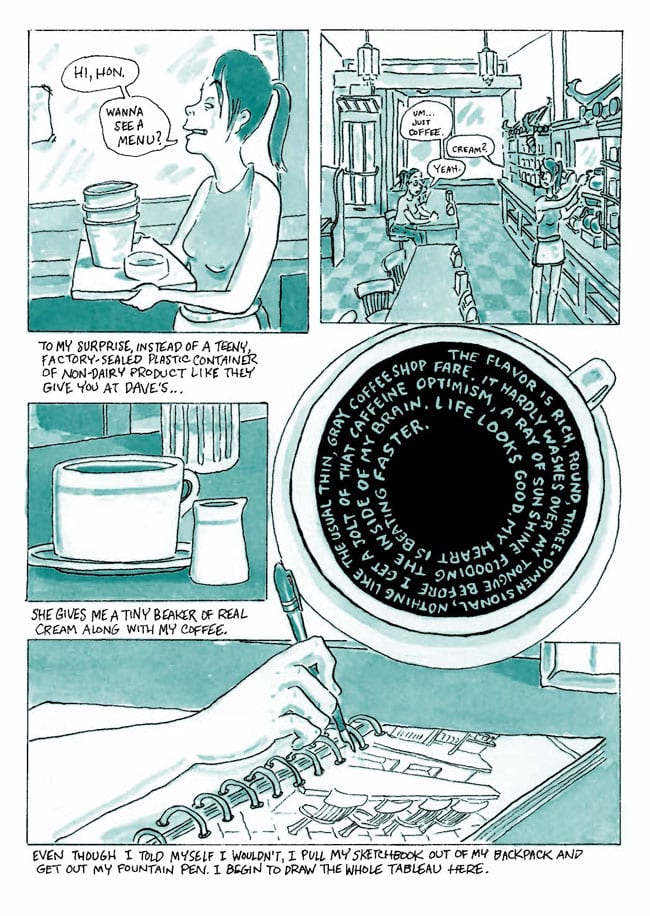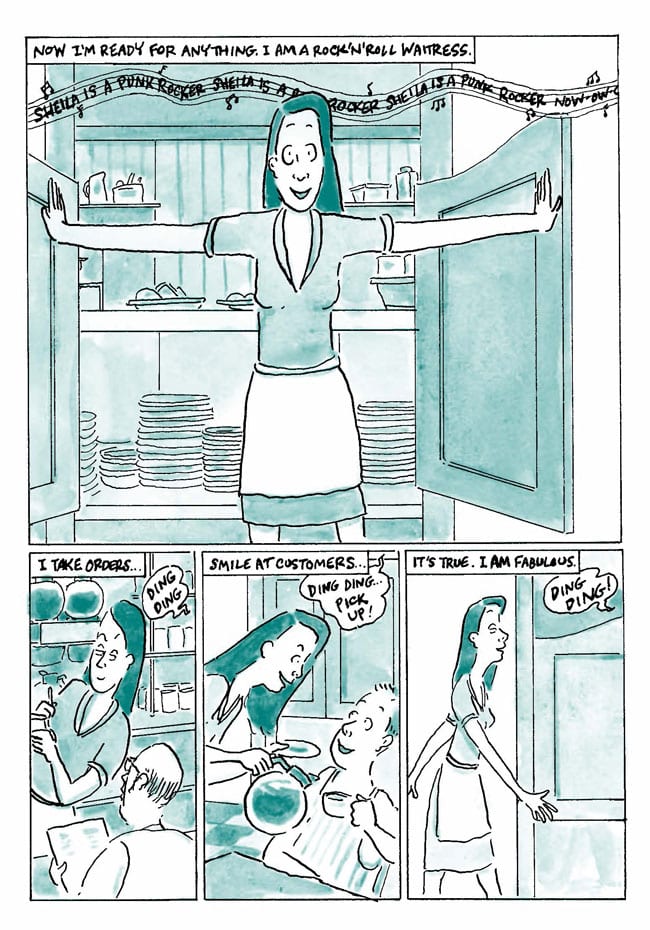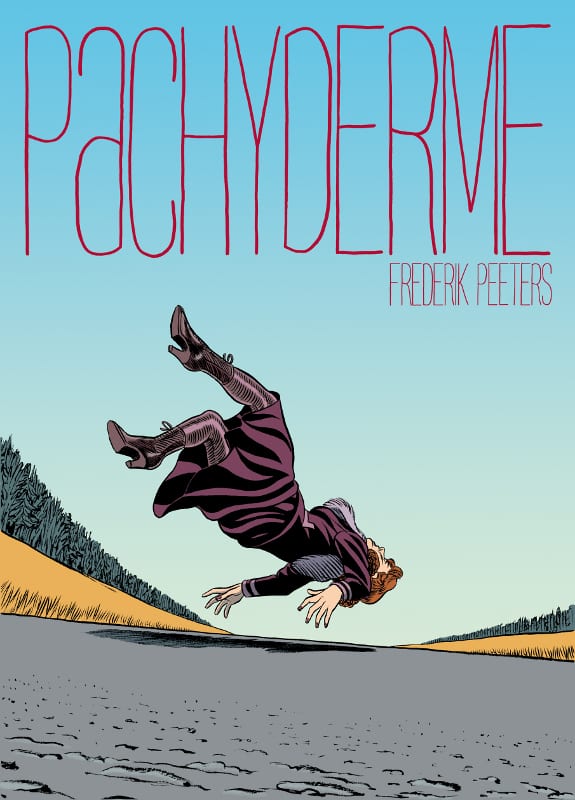The semi-autobiographical memoir Over Easy marks a very welcome comeback for cartoonist and writer Mimi Pond. Almost two decades ago, Pond took an extended leave of absence from full-time cartooning and writing to raise her children with her husband, the celebrated LA-based artist Wayne White. Her formidable list of credits up to that time include humor books like The Valley Girl’s Guide to Life (1982) and A Groom of One’s Own and Other Bridal Accessories (1993), contributions to National Lampoon, Seventeen, and the Village Voice, and writing for iconic '80s TV shows like Designing Women and Pee-wee's Playhouse. On top of all that, she owns bragging rights that come with having written the first full-length broadcast episode of The Simpsons (“Simpsons Roasting on an Open Fire”).
Even with all this impressive, high-profile work, my fondest memory of her earlier efforts remains a little comic strip called Famous Waitress School, a sort of early forerunner to Over Easy, albeit more modest in scope. She drew it for Tables, a restaurant industry magazine of the mid-to-late-'80s. I loved the strip for its sly humor, clearly written by a restaurant insider (I was waiting tables myself at the time). In the comic, Pond captured such time-honored server travails as protecting days off from treacherous coworkers and guarding customers from the rotten daily specials management insists on pushing. Restaurants can be seething hotbeds of workaday drama and interpersonal conflict and in Over Easy Pond has the luxury of 271 pages to incorporate all of her knowledge and arcana of the industry as a backdrop to her larger coming-of-age story.
Pond also offers a vivid, perfectly rendered snapshot of the late '70s, that strange, lost period of time that bridged the hippy '60s and the go-getter '80s. The '70s culture was groping toward an identity, and it’s the perfect backdrop for Pond’s young heroine, who was busy doing the same.
The story opens in May 1978, in Oakland, California. Margaret has just lost financial aid for her final year of art school. Eager to trade her suburban middle-class student persona for some Real Life experience, she lucks into a job at the funky Imperial Café. Though naïve and inexperienced, our heroine— instantly renamed “Madge” by the manager, Lazlo— enthusiastically embraces the sex, drugs, and rock ‘n roll ethos of the café and its denizens. She moves up from dishwasher to waitress, loses her virginity, and begins to gain the savvy required to make it in the adult world, while never forgetting her raison d'être: being an artist. Madge instinctually knows that her working and struggling for a living, outside of the cloistered atmosphere of art school, will broaden her creative life.
Madge’s co-workers are a colorful lot. There’s the aforementioned Lazlo, the smart, overeducated manager with a wife and four children who also writes poetry (that’s actually good); Helen, the femme fatale waitress always grappling with a million boyfriends; the tough-talking but romantic waitress Martha; the foul-mouthed, super anal-retentive cook Tony (“Mussolini in a cap-sleeve baby tee”); Bernardo, the creepy-looking prep cook who turns out to be a ladies’ man; Babette, the funky drag queen hostess, and many others. These people work together, do coke and other drugs together, and occasionally, hook up. It's all one big late-'70s dysfunctional family. And try-anything-once Margaret fits right in. This is no Afterschool Special, folks.
In between all the drug-fueled high-jinks and wacky sexual roundelays are quieter moments, moments of melancholy and reflection. In a beautifully observed sequence late in the book, Madge slowly walks home after a post-work tête-à-tête with Lazlo, taking note of all the landmark buildings on the way, including an aging strip mall and a run-down fern bar. She arrives at her apartment building, which she tells us, “is in a state of decay that is still romantic, before it hits desperation… Almost everyone I know lives in a house like this.” Though exhilarated by living out her hash-slinging “Joan Blondell fantasy,” Madge realizes there is always the possibility of staying too long, of fantasy becoming a very unromantic reality. In one of my favorite scenes in the book, Madge describes the various detritus from the past — abandoned bric-a-brac and unfinished business — left behind in the corners of her apartment. It’s an elegant, allusive illustration of the passing of time, of dreams abandoned. “I want it to be clear,” she says. “I’m not just a waitress.” She makes a habit of regularly showing her sketchbooks and drawings to co-workers and favorite customers, refusing the possibility of her work life suffocating her artistic ambitions. Lazlo, meanwhile, has slowly deferred his artistic dreams to raise his family, while a cook named Sammy writes poetry on the side (it’s bad, but hey, he’s trying).
Pond draws Over Easy with slightly trembling, spidery lines under a light-to-dark sea-green wash that complements the memoir without sentimentalizing it. The delicate feel of her lines creates a nice tension with her earthy sensibilities and often-ribald sense of humor. Like fellow cartoonist Julia Wertz, she shines when drawing crowded spaces with all their minutiae intact. The Imperial Café itself is a major character and she ably captures its many commonplace components in obsessive detail, bringing the restaurant to its full, chaotic life: the stacks of coffee cups behind the counter, the napkin holders, sugar containers, water pitchers, and ashtrays.
Her comic timing is impeccable. In what becomes a running gag, the restaurant employees frequently burst through the swinging kitchen doors in wide-eyed excitement, sexual triumph, or a rush of cocaine-fueled energy, adding to the larger-than-life, comedic-dramatic swirl of activity. Pond’s deft fusion of bildungsroman, high comedy, and social observation is smart, funny, and downright irresistible. Over Easy is a triumphant return from a cartoonist absent far too long from the scene. It’s good to have her back.











